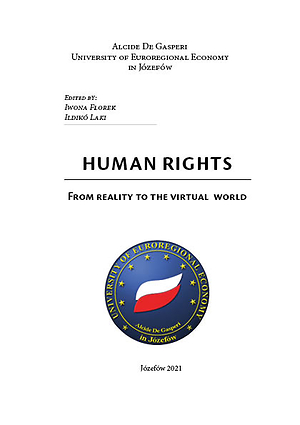Wydawnictwo
AWSGE
AWSGE

Akademia Nauk Stosowanych
WSGE
im. Alcide De Gasperi
WSGE
im. Alcide De Gasperi
BOOK

HUMAN RIGHTS - From reality to the virtual world
Publication date
2021-12-02
ISBN
978-83-954584-3-9
Place
Józefów
Format
210x148
Binding
Pages count
382
Editors
Iwona Florek, Ildikó Laki
Publisher
WSGE
CHAPTERS
ARTIFICIAL INTELLIGENCE TRANSFORMING THE WORLD
THE RIGHT TO RESPECT PRIVATE LIFE IN
THE CONTEXT OF THE DEVELOPMENT OF
ARTIFICIAL INTELLIGENCE
Greta Angjeli, Besmir Premalaj
10-19
ARTIFICIAL INTELLIGENCE, ETHICS, AND THE CATHOLIC CHURCH
Veronika Čunderlík Čerbová
20-31
FINANCIAL AND LEGAL ASPECTS
OF ARTIFICIAL INTELLIGENCE – AN
OPPORTUNITY OR A THREAT TO BUDGETS?
Elżbieta Feret
32-42
THE IDENTITY AND GENDER PROBLEM IN
THE CONTEXT OF AI
Renáta Kišoňová
43-55
56-68
TAXATION OF ARTIFICIAL INTELLIGENCES
AND TAXABLE CASES
Salvatore Parente
69-83
91-112
113-123
ARTIFICIAL INTELLIGENCE
AND COPYRIGHT
Fiona Tako, Jona Marashi
124-134
THE TAXATION OF ARTIFICIAL
INTELLIGENCE BETWEEN NEW TAXES
AND ADDITIONAL INCENTIVES
Antonio Uricchio
135-159
HUMAN RIGHT IN REALITY 4.0
THE CONCEPT OF THINGS IN THE VIRTUAL
WORLD FROM THE THEORY OF HUMAN
RIGHTS FOR PROPERTY
Bronisław Sitek
161-177
ARTIFICIAL INTELLIGENCE: THE RISK OF
INVASION OF HUMAN RIGHTS AND LEGAL
REGULATION OF THESE PROCESSESIN THE
EU AND THE WORLD
Anastas Angjeli, Redion Luli
178-189
LEGAL INSTITUTIONS SECURING
SOCIALLY RECOGNISED RIGHTSOF THE
SUBJECTS PARTICIPATING IN LEGAL
TRANSACTIONS, BASED
ON THE EXAMPLE OF LEGITIMATE
EXPECTATIVE
Joanna Bocianowska
190-198
EPIDEMICS, GENOME EDITING AND HUMAN
RIGHTS
Branislav Fábry
199-209
COMPETENCE IN LIGHT OF THE
CHALLENGES OF THE VUCA REALITY AS AN
IMPORTANT ELEMENT OF HUMAN RIGHTS
Bartosz Sobotka, Iwona Florek
210-225
ARTIFICIAL INTELLIGENCE AND PRIVACY
Daniela Ježová
226-237
INFORMATION RETRIEVAL AGAINST THE
HUMAN RIGHT TO PRIVACY
Weronika Pielak-Sitek, Wojciech Sitek
238-249
SOCIETY UNDER THE INFLUENCE OF TECHNOLOGY
251-259
LINEAR ECONOMY, CIVIL ECONOMY AND
CIRCULAR ECONOMY: EDUCATION
AS A CATALYST FOR TRANSITION
Rosa Indellicato
260-269
ELECTRONIC DELIVERY: OPPORTUNITY
OR EXCLUSION?
Agnieszka Korzeniowska-Polak
270-278
SOCIAL ASPECTS OF ARTIFICIAL
INTELLIGENCE – SELECTED ISSUES
Marcin Kowalczyk
279-294
TOURISM AND ENVIRONMENT IN
CYBERWORLD OF CYBER SOCIETY
Ksenofon Krisafi, Jonida Vila
295-303
RIGHT TO EDUCATION – YOUNG PEOPLE
WITH DISABILITIES AND CHILDREN WITH
SPECIAL EDUCATIONAL NEEDS
Ildikó Laki
304-313
ONLINE MEDIATION IN EDUCATION AS AN
OPPORTUNITY ON CONFLICT RESOLUTION
IN THE MODERN WORLD
Aleksandra Lukasek
314-325
326-339
EUROPEAN SEMESTER–SPRING PACKAGE:
RECOMMENDATIONS FOR POLAND ON
THE SOCIO-ECONOMIC RESPONSE TO THE
COVID-19 PANDEMIC
Maciej Serowaniec
340-350
THE INFORMATION SOCIETY AND
DIGITAL TRANSFORMATION OF A STATE:
DEVELOPMENT AND INTERPRETATIONS IN
THE FUTUROLOGICAL THOUGHT
Edyta Sokalska
351-367
WASTE MANAGEMENT AND HUMAN RIGHTS
TO THE ENVIRONMENT IN POLISH AND
LITHUANIAN LEGAL SOLUTIONS
Elżbieta Zębek, Leda Žilinskienė
368-382
ABSTRACT
Our the World in the 21st century is affected by a number of factors,
each of which also feels in a different way, whether society has been able
to respond to all these effects at a given time and in a given way. Social
reality has become multifaceted in recent years and decades, with an
increasing emphasis on rationality and the consolidation of emotions.
The present volume of the conference attempts to provide interpretations
between artificial intelligence and virtual reality from the repositories
of law, sociology, economics, and the educational-social field. Each of
the studies touches on a common point, and that is the issue of human
rights, the law of humanity. The topics were written embracing three
areas. The first group included summaries that explore or discuss the
relationships between different areas and artificial intelligence. On the
line of church and religion, law, freedom and identity, and gender and
identity. Artificial intelligence systems are widely used today in economics
and medicine, design, the military, many widespread computer
programs and video games, but also in online copywriting.
In the framework of the other large group – Human Rights in Reality
4.0 – we can read studies that specifically address human rights issues
that are also important for the topic – legal, administrative, virtual,
and data protection. Human rights belong to all people equally, universally
and forever. The universality of human rights means that they
are equally available to all human beings in all countries of the world.
They are inalienable, indivisible, and interconnected, and no one can
ever be deprived of them. All rights are equally important and complementary
– for example, the right to govern a country’s affairs or to
participate in free elections can only be exercised if the right to freedom
of expression is exercised.
And finally, the third unit includes studies that have been formulated
in different formations of the relationship between society and technology.
His exciting questions raise environmental issues that can be
linked to cyber society, especially climate issues. Similarly, the range of
descriptions related to cybercrime or electronic delivery, as well as the
world of educational and disability ideas, raises interesting questions.
To what extent rights can be violated, what tools can we find to make
society healthier, more acceptable, and what will we mean by implementing
artificial intelligence in the 21st century.
We sought and answered these questions from the studies in the
conference volume that are now available.
Ildikó Laki
PEER REVIEW INFORMATION
Article has been screened for originality
Prof. Ligita Šimanskienė,
Dr hab. Małgorzata Such-PyrgielWe process personal data collected when visiting the website. The function of obtaining information about users and their behavior is carried out by voluntarily entered information in forms and saving cookies in end devices. Data, including cookies, are used to provide services, improve the user experience and to analyze the traffic in accordance with the Privacy policy. Data are also collected and processed by Google Analytics tool (more).
You can change cookies settings in your browser. Restricted use of cookies in the browser configuration may affect some functionalities of the website.
You can change cookies settings in your browser. Restricted use of cookies in the browser configuration may affect some functionalities of the website.





